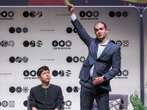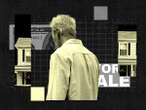AI is changing the workplace, but there is one area in which it can’t (yet) compete with humans and that’s imagination. In fact, the latest Future of Jobs report from the World Economic Forum called creativity one of the most important skills for workers today.
The problem, though is that most people don’t consider themselves particularly gifted in that area, says Duncan Wardle, author of The Imagination Emporium: Creative Recipes for Innovation and Disney’s former vice president of innovation and creativity. “When I speak to audiences, I ask people if they think they’re creative,” he says. “Less than 5% put their hands up. But I believe everyone can be creative in the right environment.”
The idea of being innovative can feel intimidating, the solution is infusing playfulness into your day. Unfortunately, the work environment isn’t set up to foster play.
“Where are you when you get your best ideas?” asks Wardle. “Not one person ever says, ‘at work.’ Ninety percent of people will say the shower.”
Get Into the Right Brain Space
The biggest barrier to innovation at work is what Wardle calls our “river of thinking.” “It doesn’t matter what industry you’ve worked in or how long you’ve worked in it, you are locked into a river of thinking that allows you to make quick and informed decisions based on your experience,” he says.
While this default setting it can be good in emergency circumstances, it hinders new ideas. “In the last four years, we’ve had a global pandemic, climate change, and artificial intelligence,” says Wardle. “We don’t get to think the way we thought four years ago. You need to stop thinking the same way you always do and think differently.”
The solution is moving from your conscious mind into your subconscious mind. The conscious mind makes up 13% of your brain’s capacity. It’s the gray matter that deals with day-to-day details and the default when you’re feeling stress. Your subconscious brain makes up the remaining 87%, but its door is closed because the two parts of your brain are rarely engaged at the same time, says Wardle.
“In that 87% is all of your creative stimuli,” he says. “It holds your experience, your expertise, and every innovation you’ve ever seen. Every creative problem is back there waiting for you to solve the challenge. When it’s closed, you can’t access it.”
Purposeful play activities help you move your brain to the “Amazing Alpha” state, which is what Wardle calls the doorway between conscious and subconscious.
Warm Up with Energizers
To warm up your brain and get into a playful state of mind, Wardle shares several energizers, or “zings,” in his book. For example, one activity is called “Experts ‘n Gurus.” Separate teams into pairs and tell one person to play the part of an expert and the other person to be a news reporter.
“I tell them, ‘Person A, you are the leading designer of parachutes for elephants. Nothing you say is wrong because you are the leading guru on this topic. Person B, you are a news reporter. Interview the designer about their job,’” says Wardle. “When you hear some of the answers people come up with, you realize anyone can be incredibly creative.”
Another zing is “Random Connections.” In this activity, each participant is given 60 seconds to find a random object in a room. Then the group splits up into pairs and has to invent a new business that uses their two random objects as stimuli. Then they get 60 seconds to pitch their idea to the team.
And a third zing is called “Once Upon a Time.” Teams create a story by having each person add one sentence at a time. Wardle says this zing fuels creativity and strengthens teamwork, using collaboration to create a tale.
Implement Creative Behaviors
Energizers are tools that help you with the “doing” of innovation. Creative behaviors, or what Wardle calls “sparks,” shape your mindset and are the “being” of innovation. Wardle calls them the secret sauce for unlocking creativity on a regular basis.
One spark is to adopt a mindfulness practice, which increases focus, enhances observation and awareness, and reduces stress and anxiety. “Mindfulness helps foster a nonjudgmental attitude, allowing you to be more open to new ideas and experiences,” says Wardle. “Embracing a beginner’s mindset, free from your river of thinking, can help foster more innovative and creative thinking.”
Another example of a spark is using your intuition. This involves being willing to trust your gut and listen to your conscience. To be more intuitive, Wardle recommends taking a deep breath, clearing your thoughts, and listening to what your heart is telling you. “Listen to that ‘eureka’ moment,” says Wardle. “That ah-ha moment of brilliance that appears in a flash may be worth considering.”
You can also reflect on your dreams to find your spark. Capture the ideas that come to you as you drift off to sleep. Engaging in activities that put you into a childlike mindset can also enhance intuitive thinking.
Everyone has the capacity to be creative, says Wardle. “I don’t define creativity as the ability to paint or draw or write music,” he explains. “Those are a form of creativity. I define creativity as the ability to have an idea. We can all do that. We all have hundreds every single day. Innovation is the ability to get that idea done. That’s the hard part.”










No comments